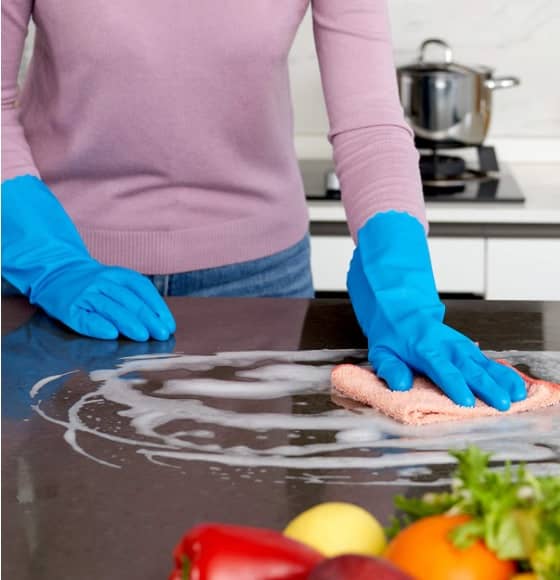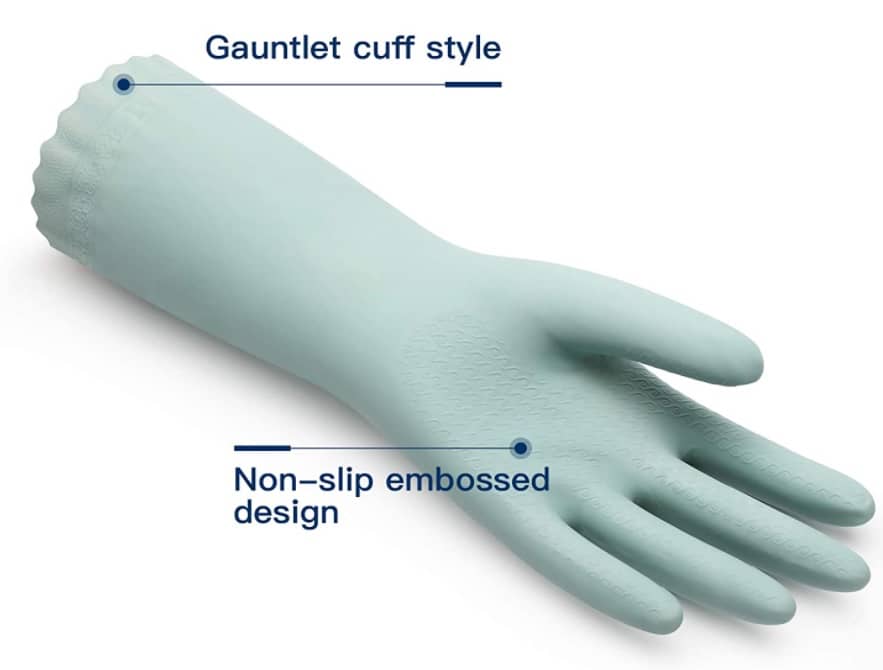Do you know what part of a dishwasher keeps your dishes from having white stains? It is a built-in water softener. It keeps the nasty hard water films at bay.
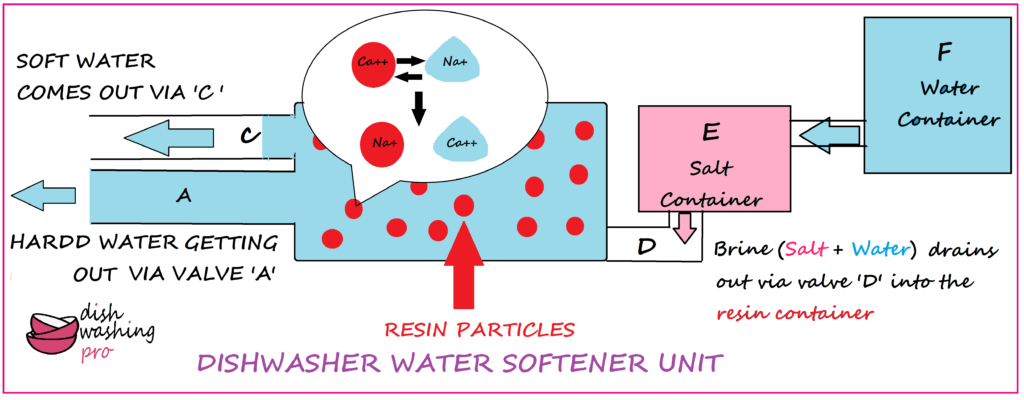
If you are living in a hard water zone and not have a dishwasher water softener, then you are missing out on a great deal of efficiency in your dishwasher.
Here’s what I have discussed in this article along with the working process of the dishwasher water softener.
- What is hard water and why does it need to be softened?
- Do I need a dishwasher water softener?
- How Does Dishwasher Water Softener Work?
- Do I need dishwasher salt and why so?
- How to decide the right salt setting for the dishwasher water softener?
- How often should you put salt in a dishwasher to run the dishwasher water softener efficiently?
- More detailed steps via which a dishwasher water softener work (step by step process)
Hard water is a worldwide problem. No matter where you live you can experience hard water anywhere in the globe.
I used to live in India where hard water is a headache for every household. Currently, I reside in Minneapolis where we get our water from the Mississippi River. Though it is softer, in the suburbs, where they use groundwater, the water hardness ranges between 20 – 25 grains per gallon (EXTREMELY HARD WATER).
As a matter of fact – 85% of the land in the United States is under the water hardness range. More than 80% of the land in India is affected by moderate to extremely hard water.
If you are too seeing hard water stains and experiencing symptoms (as discussed below) then having a built-in water softening unit will undoubtedly be helpful. Also understanding how it works will guide you to use the dishwasher with the correct salt setting.
Dishwasher water softener unit softens your hard water but what is hard water and does it really need to be softened?
Ever heard of calcified water? When minerals like calcium and magnesium dissolve in the water, they make it hard. And the Ca++ and Mg++ ions are known as the hard ions.
Drinking or using hard water is not bad for your health, but using hard water in cleaning your dishes may build up limescale and your dishes will look awful while serving. So, removing hard water stains from your dishes has more of an aesthetic purpose rather than a health benefit.
Do I need a Dishwasher Water Softener?
The answer is simple. Just check if the water running through the pipes is hard or not. You can do that in a laboratory or via a water hardness test kit or you can check some of the symptoms on your own.
Symptoms:
- White build up on the shower.
- Clothes are not very clean even after washing them rigorously.
- Dishes will have white spots.
- It takes more soap or shampoo to make suds.
If the symptoms are not present then probably your water is soft. But that doesn’t always mean you don’t need a dishwasher water softener. I have written this article – Is a water softener dishwasher worth it? -An Owner’s Perspective, in case you are wondering.
To reconfirm, you can go to the nearest home improvement shop and buy a water hardness test kit or order this kit on amazon.
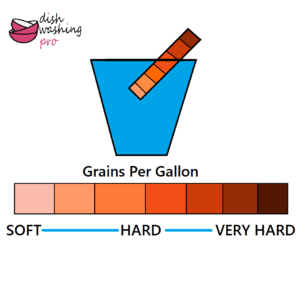
Just fill in a glass with room temperature tap water, put the test strip, and look for color change. Then match the color with the water hardness chart. Anything above 7 grains per gallon, is deemed as hard water.
How does a Dishwasher Water Softener work to help in removing those hard ions?
To make hard water soft, the calcium and magnesium ions that are messing with your water need to be removed. The built-in water softener in the dishwasher swaps these ions with safer sodium ions and make the water soft.
Overview of the Working Process:
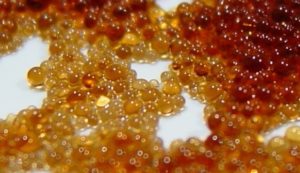
There are some ion exchange resin particles in your water softener.
The resin particles are coated with sodium ions. When hard water passes through the resin, the Ca++ and Mg++ ions come into contact with the sodium or Na+ ions.
Hence an ion exchange takes place, where one Ca++ ion replaces two Na+ from the surface of the resin.
This is how sodium ions mix into the water and the calcium and magnesium ions get attached to the resin particles. Thus, swapping every ion of calcium and magnesium with sodium makes the water soft.
But the resin particles have a limited capacity and need to be regenerated.
How does the dishwasher softener work to regenerate resin particles?
When all the resin particles are attached to calcium and magnesium ions, the particles will not be able to soften the water anymore as there will be no sodium ion to swap.
That’s why the regeneration of the resin particles is essential. And here comes the role of your dishwasher salt.
So, if you are wondering,
‘Do I really need dishwasher salt and why so?’
You need dishwasher salt. Because the dishwasher salt helps the water softener unit to run efficiently. When the resin particles in the softener unit need regeneration to make your water soft, they need sodium ions. And the cheapest way to regenerate those particles is by using salt or Sodium Chloride (NaCl).
But not your table salt.
Dishwasher salts are manufactured for a purpose. They have larger sized granules, whereas the fine grains of the regular salt will damage and block your dishwasher. So always use a boosted dishwasher salt like this one (Amazon link). It gives you better results.
But have you wondered one thing? That how does the dishwasher water softener unit decide how much salt is needed to completely remove the hard ions from the water?
Well, it doesn’t. You need to put down the dishwasher salt setting properly to let your dishwasher use the exact amount of salt. Not less, not more.
How to decide how much salt does my dishwasher needs to clean the dishes?
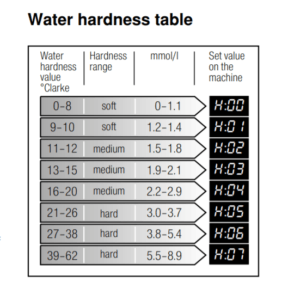
When I bought my Bosch dishwasher with a built-in water softener, the manual guide came with a chart (refer to the above image) where the water hardness is measured in degree Clarke. The hardness range was given as well as the salt value I needed to set in my dishwasher, was clearly illustrated.
But guess what? I didn’t know the hardness level of my tap water, so the chart was completely useless for me.
Pro tip: If you can visit a laboratory or use the test kit to know the exact water hardness level, then surely make full use of the manual guide that comes with your dishwasher. And I highly recommend using the test kit too.
But people who are lazy like me, I will give you my trick.
The rule of thumb with a new dishwasher is always – trial and error. Try the settings from the beginning.
In my case,
I first set the dishwasher in H:01 and ran a wash load, and then I saw that the clean dishes came out with a very little amount of stain.
So, next time I set the wash load to H:02 and my dishes came out completely spotless and that’s how I found my perfect salt setting.
There is no harm in trying and finding out what works for you because no dishwasher is alike.
Bottom line: Check the manual and see how to put the salt setting and start from the first or second setting option (really depends on the hard water symptoms you are observing – if that white build-up is strong in your house then put down your dishwasher salt setting in the upper level or vice versa).
How often do you need to put salt in a dishwasher?
You need to fill the entire salt container until it’s full. Your dishwasher salt will not get wasted, because you are going to put the salt setting according to the water hardness level, and the dishwasher will only take the amount you have directed to clean the dishes.
Let’s dig deeper into the process of water softening to avoid rookie mistakes.
I don’t know if you will be interested in these detailed steps, but learning these helped me to understand my dishwasher better. So, whenever my dishwasher shows some technical fault, I don’t panic. No, it doesn’t mean, I fix it myself. I still call a mechanic, but at least I know what’s going wrong and the mechanic stands no chance to extort an unfair amount of money when the issue can be resolved under a few bucks.
How Does a Dishwasher water softener work in a step by step process?
I did some research and found out that the steps are pretty simple, only If you have the patience to learn. But before going to the steps here is a bit of very useful information.
Do I need dishwasher salt in soft water area?
No, you don’t. As I have mentioned earlier in this article, the main function of a dishwasher salt is to help the dishwasher water softener to work effectively. The salt provides the dishwasher water softener with sodium or Na+ ions. These Na+ ions swap position with hard ions like Mg++ and Ca++ to make the water soft. Clearly, having soft water in your tap will eliminate the need for dishwasher salt.
Here is a simple schematic to help you understand how does dishwasher water softening unit work. Refer to the image while reading the steps.

a. When you press the start button of the dishwasher, the water pours in, and valve A opens up. The water then goes through valve A to B where the resin particles are stored.

b. In B, ion exchange takes place. Resin particles that are coated with sodium ions, swap the magnesium and calcium ions in the hard water with sodium ions hence the water softens.

c. The softened water then flows out via C from the resin container into the dishwasher. Slowly all the sodium ions in the resin particles are swapped and now the resin particles need to be regenerated.

d. The D valve will open up in this situation, which is the outlet to the salt container E. Here comes the function of the F which is a water-can. Water from F runs down to the salt container and make a brine (concentrated salt solution) and displaces the brine into the B resin container via the D outlet.
e. The brine then replaces the hardness ions (Na+ swaps position with Mg++ and Ca++) on the resin particles. Now the water in the resin contains hard ions which often known as ‘spent brine’. The D valve will close and the A valve will open up, via which the spent brine or you can say hard water will drain out, without affecting the water inside the dishwasher.
The draining out of the hard water from the resin container takes place when the wash pump is switched off to avoid contact with the wash load. The F can will then be refilled and made ready for the next regeneration process. So, this is how the dishwasher water softener works cyclically to remove hard ions from your water and make it soft enough to save your dishes from deposits and stains.
Thanks for reading the article until the end. I tried to give you all the information, knowledge and experience I had all these years with my dishwashers. So, feel free to comment, or post a query, I will be happy to help.
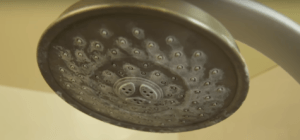

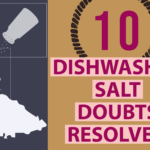








![[Best Dishwasher Detergent] to Prevent Etching Your Glassware etchproof](https://dishwashingpro.com/wp-content/uploads/2020/06/etchproof-100x100.png)


